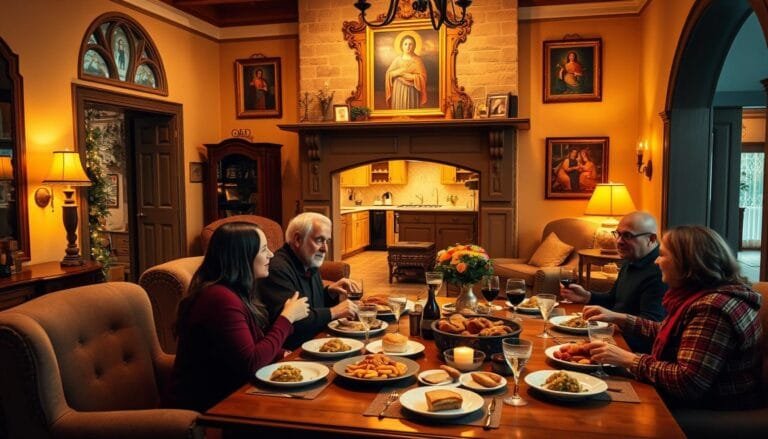4 Habits Of Successful Relationships
This website contains affiliate links. As an Amazon Associate, I earn from qualifying purchases. The content on this website was created with the help of AI.
Elizabeth Seton, the first American-born Catholic saint, left a rich legacy. She wrote extensively about faith and relationships.
Her teachings offer valuable insights for building lasting love rooted in faith.
Many couples struggle to maintain strong bonds in today’s fast-paced world. High divorce rates and relationship challenges are common.
However, certain habits can significantly improve your chances of a successful, faith-based relationship.
Let’s explore four key habits of successful relationships. We’ll examine how faith-based partnerships can withstand modern life’s tests.
These insights will help you nurture your bond and grow closer to God together.
Key Takeaways:
- Elizabeth Seton’s teachings offer valuable insights for Catholic relationships
- Faith-based relationships can thrive in modern society
- Four key habits contribute to successful Catholic marriages
- Balancing faith and modern life is crucial for lasting love
- Practical applications can strengthen your relationship daily
Understanding the Foundation of Catholic Relationships
Catholic relationships thrive on faith and love. These bonds can withstand life’s challenges. The sacrament of marriage is crucial in Catholic doctrine and family life.
The Role of Faith in Building Strong Bonds
Faith strengthens Catholic marriages by providing shared values. It offers a moral compass for couples. God-centered relationships find strength, guidance, and purpose.
“Love is patient, love is kind. It does not envy, it does not boast, it is not proud.” – 1 Corinthians 13:4
Catholic Principles for Healthy Relationships
Healthy relationships are built on Catholic principles. These include respect, forgiveness, selflessness, and commitment. Couples should prioritize their marriage and communicate openly.
Catholic marriage counseling helps couples apply these principles daily.
Merging Faith and Modern Life
Integrating Catholic values into modern relationships can be challenging. We suggest couples try these practices:
- Pray together daily
- Attend Mass as a family
- Volunteer in their community
- Practice forgiveness and patience
Living Christian values daily creates strong, faith-centered relationships. These bonds can thrive in today’s world.
| Pillar | Description | Biblical Reference |
|---|---|---|
| Love | Patient, kind, selfless | 1 Corinthians 13:4-7 |
| Trust | Fidelity, honesty, reliability | Proverbs 3:5-6 |
| Respect | Mutual regard, appreciation | Ephesians 5:33 |
| Communication | Open, honest dialogue | James 1:19 |
4 Habits Of Successful Relationships
Relationship habits build strong, lasting bonds. Four key practices can transform your relationship and foster deeper emotional connections.

Be curious, not critical. Approach your partner with genuine interest during conflicts. This habit encourages open dialogue and brings you closer together.
Practice being careful, not crushing. Choose your words thoughtfully to maintain respect. Avoid harsh words or actions that can damage trust.
Ask, don’t assume. Inquire about your partner’s thoughts and feelings. This habit prevents misunderstandings and improves communication skills.
Connect before you correct. Show warmth and interest before addressing issues. This approach makes your partner more receptive to your ideas.
These habits help overcome obstacles and nurture thriving relationships. Successful couples consistently demonstrate these behaviors. Failing relationships often lack one or more of them.
“People are more likely to be receptive to thoughts and ideas when approached with tenderness and interest.”
Developing these habits takes time and effort. The rewards are immeasurable. Focus on curiosity, carefulness, asking questions, and connection.
You’ll build a strong foundation for lasting love. Your conflict resolution skills will improve. A healthier, happier relationship awaits.
Navigating Common Relationship Hurdles
Relationships face many challenges. The right approach can help overcome them. Let’s explore common hurdles and address them in a Catholic context.
Overcoming Communication Barriers
Communication is key in any relationship. Criticism can be a major roadblock. It makes partners feel attacked and unheard.
Try reframing your concerns positively. Say, “I feel worried when you’re late” instead of “You’re always late.” This approach fosters trust-building and open dialogue.
Building Trust and Respect
Trust and respect form strong Catholic marriages. Contempt, shown through sarcasm or disrespect, can erode these elements. Combat this by nurturing fondness and admiration.
Express gratitude for your partner’s positive qualities and actions. Make this a daily habit to strengthen your bond.

Managing Expectations in Catholic Marriage
Catholic marriage expectations include mutual support and shared faith. Defensiveness can arise during conflicts, with partners denying responsibility.
To address this, practice taking mutual responsibility.
Remember, it’s not about winning arguments. Focus on growing together in faith and love.
“Embracing an experimental mindset for iterative success is encouraged in relationships.”
Addressing these challenges head-on strengthens bonds. It creates fulfilling partnerships rooted in the Catholic faith. Tackle issues together to build a stronger relationship.
Practical Applications in Daily Life
Faith in action strengthens Catholic marriages. Let’s explore relationship exercises and activities to enhance your bond. These practices can deepen your connection and spiritual growth.
Begin your day with a shared prayer. This simple act sets a positive tone for the day. During meals, take turns sharing blessings. These moments foster connection and gratitude.
Read a scripture verse together daily. Discuss its meaning in your lives. This practice deepens your understanding of faith and each other.
“Open dialogue revitalizes team motivation, whether at home or work.”
Volunteer as a couple for causes you both care about. Serving others aligns with Catholic values. It creates shared experiences and strengthens your bond.
Attend Mass together regularly. This reinforces your commitment to faith and each other. After Mass, discuss the homily’s relevance to your life.
| Activity | Benefit | Frequency |
|---|---|---|
| Shared Prayer | Spiritual Connection | Daily |
| Scripture Reading | Faith Understanding | Weekly |
| Volunteer Work | Shared Purpose | Monthly |
| Attending Mass | Faith Reinforcement | Weekly |
These activities are chances to grow in faith and love. They’re not just tasks to complete. By practicing consistently, you’ll build a stronger, more fulfilling Catholic marriage.
Conclusion
Catholic couples can build lasting love through key habits. These include curiosity, care, communication, and connection. These tools can change how we interact with our partners daily.
Successful relationships need effort and growth. Studies show that avoiding criticism and contempt helps improve relationships.
Gentle talk, appreciation, and shared responsibility lead to better outcomes for couples and families.
Catholic relationship success is more than just avoiding fights. It’s about growing your bond through shared goals and respect. Keeping faith central helps build a strong, lasting partnership.
Let’s make our relationships a top concern. There’s always room to grow in faith-centered partnerships. If you need help, seek support and resources for your journey.






